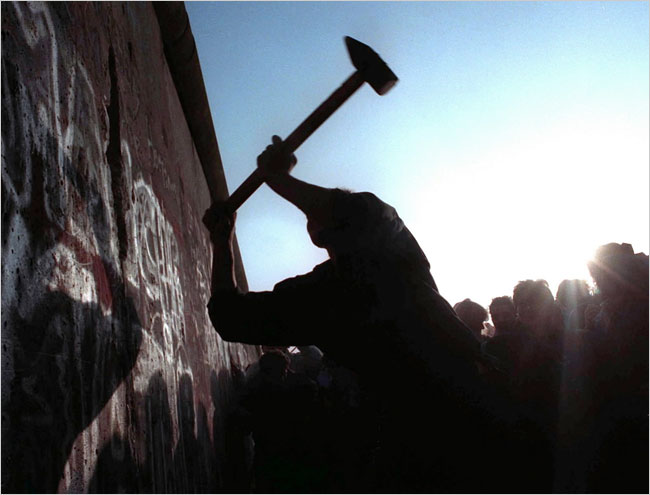
What I didn't realize until recently is that in the 1980s everyone was a Communist. All of our communication was trapped, contained behind walls. We were hidden from others and they were hidden from us.
As a Technology Teacher in 2011, I am constantly amazed at how easy connections form through social media. If I come across someone on TV, YouTube, in a print or digital article, I can probably find a way to contact them in minutes online. Not their agent, not their studio, not their publisher . . . them. When I see these people or read about them, I get that mental flash where I think that is exactly what I am trying to help my kids to understand! So I use the interwebs to find a way to contact them whether it be their e-mail, Twitter account, Facebook page, telephone number it doesn't matter.
A nice percentage of my lessons are collaborations with different fascinating people of all stripes: writers, entrepreneurs, hackers, and students and teachers from across the globe. I wonder if I was transported back to the 1980s if it would even be possible to do any of this. Where would I start?
Let's say it's 1982. Let's say I happened to have a magazine with an article about someone who could add something important to a unit we were working on in class. Maybe I caught a TV show on one of the 5 channels with some fascinating character. I might want to bring them into my class somehow. I certainly couldn't tweet them an invite and Skype them in the next day, that's for sure.
What's my first step, getting the Yellow Pages? Getting the White Pages? Thinking if someone I know might be a degree or two closer to them and leapfrog my inner-circle? Post an ad in the newspaper in the town where they live? How would I even find out where they live? Call up the government? Hire a Private Investigator? Even if I got their number or their mailing address, how would I get them into class? Fly them to my state, ask them to take a train or rent a car, have a 30 minute chat with my kids and then go home?
Seems crazy, all of it. Okay maybe the idea that everyone was a communist in the 1980s is a little crazy too, but the ability to connect and communicate on this level certainly makes it seem like they were. In November of 1989, the BBC wrote an article about the fall of the Berlin Wall that sort of sums up the last 20 years of communications:
"At midnight East Germany's Communist rulers gave permission for gates along the Wall to be opened after hundreds of people converged on crossing points. They surged through cheering and shouting and were be met by jubilant West Berliners on the other side. Ecstatic crowds immediately began to clamber on top of the Wall and hack large chunks out of the 28-mile (45-kilometre) barrier."


I agree with the idea that the walls need to come down. If students experience the world from behind a wall, then they learn nothing about what they need to be safe in that world. At the very least, the filter should come down gradually over time so that students can gradually learn the skills they need to be safe online, while gaining access to the resources and ideas that all of us get to use productively on a daily basis.
ReplyDeleteThanks for taking the time to read and comment, David! I agree that it is so important to work with social media in a controlled environment so that students learn how to be safe. Safe, wise usage is so important and taking the gradual approach you describe is a great way to ease in.
ReplyDeleteIf teachers remain unconvinced about student safety, I would say that argument doesn't stop them from using it to leverage the power *for* their students.